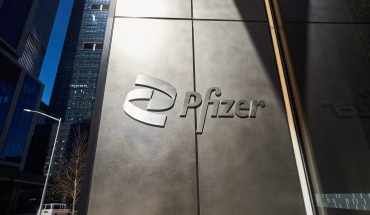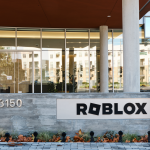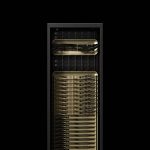
Pfizer Invests $1.25B in Chinese Cancer Drug After Rigorous Verification
5 minute read

Major Pharmaceutical Company’s Record Chinese Investment Follows Unprecedented On-Site Data Verification
Three Key Facts
- Pfizer invested $1.25 billion in SSGJ-707, a PD-1xVEGF bispecific antibody, with total financial commitment reaching $6 billion based on milestone achievements
- CEO Albert Bourla deployed verification teams to China to personally review trial data and interview physicians, demonstrating unprecedented due diligence for Chinese-origin clinical data
- Clinical trials combining ivonescimab with Pfizer’s vedotin-based ADCs will begin mid-2025, targeting multiple solid tumor types through strategic collaboration with Summit Therapeutics
Introduction
Pfizer CEO Albert Bourla has pulled back the curtain on the pharmaceutical giant’s extraordinary verification process for its $1.25 billion investment in Chinese-developed bispecific antibody SSGJ-707. The investment represents one of the most significant bets on Chinese clinical data by a major Western pharmaceutical company.
The acquisition positions Pfizer in the competitive PD-1/L1xVEGF domain following Summit Therapeutics and Akeso’s success with ivonescimab, which recently outperformed Merck’s Keytruda in head-to-head trials. This development signals a major shift in how pharmaceutical companies approach international partnerships and data validation.
Key Developments
Bourla detailed Pfizer’s hands-on verification approach, which extended far beyond traditional data room assessments. The company dispatched teams directly to China to conduct on-site reviews and engage with study physicians personally. This intensive process addressed growing industry concerns about the reliability of clinical data from Chinese trials in global regulatory settings.
The investment follows Pfizer’s establishment of a clinical trial collaboration with Summit Therapeutics announced in February 2025. This partnership evaluates ivonescimab, a PD-1/VEGF bispecific antibody, in combination with Pfizer’s antibody drug conjugates across multiple solid tumor applications.
Clinical trials incorporating vedotin-based ADCs will commence in mid-2025. These ADCs include Pfizer’s approved products Adcetris, Padcev, and Tivdak, which the company acquired through its Seagen takeover.
Market Impact
The bispecific antibody drug conjugates market remains in early development stages but shows substantial growth potential. Major pharmaceutical companies including Amgen, Innovent Biologics, and AstraZeneca are actively expanding their BsADC pipelines, primarily focusing on oncology applications for both hematological and solid malignancies.
Pfizer’s full $6 billion financial commitment depends on achieving high sales milestones through structured payments. This performance-based approach reflects the company’s strategic risk management while positioning SSGJ-707 as a potential successor to current PD-1/L1 checkpoint inhibitors.
According to Fierce Biotech, the investment highlights ongoing industry uncertainties about Chinese trial data robustness in global regulatory environments.
Strategic Insights
Bourla emphasized SSGJ-707’s potential to enhance vedotin-based ADC efficacy, marking a critical component of Pfizer’s immunotherapy advancement strategy. The integration represents a calculated move to leverage synergies within Pfizer’s existing ADC portfolio acquired through the Seagen acquisition.
The investment aligns with Pfizer’s comprehensive cancer care vision presented at ASCO 2025. The company highlighted its “industry-leading portfolio and extensive pipeline” featuring “three core mechanisms of action to attack cancer from multiple angles.”
Bourla’s approach demonstrates evolving industry standards for international partnerships. The unprecedented verification process sets new benchmarks for due diligence when evaluating assets with non-Western clinical data origins.
Expert Opinions and Data
Bourla expressed confidence in the validated findings, stating that Pfizer’s interactive verification approach surpassed standard assessment methods. The CEO’s emphasis on personal site visits and physician interviews reflects growing industry demands for transparency in global clinical data.
When addressing analyst inquiries about the investment structure, Bourla highlighted the milestone-based payment approach. This strategy allows Pfizer to manage risk while maintaining substantial upside potential based on commercial performance.
The CEO also addressed Pfizer’s broader acquisition strategy, particularly regarding obesity treatments. “We are not going to overpay. And, right now, there are a lot of crazy demands,” Bourla stated, illustrating the company’s disciplined approach to current market conditions.
Industry observers note that Pfizer’s verification process may establish new standards for evaluating international clinical assets. The comprehensive approach addresses regulatory concerns while enabling access to innovative treatments developed in emerging markets.
Conclusion
Pfizer’s meticulous approach to validating Chinese clinical data represents a significant evolution in pharmaceutical due diligence practices. The $1.25 billion investment in SSGJ-707, backed by unprecedented verification measures, demonstrates how major pharmaceutical companies can navigate international partnerships while maintaining regulatory confidence.
The strategic combination of bispecific antibodies with existing ADC portfolios positions Pfizer at the forefront of next-generation cancer therapeutics. Bourla’s disciplined investment philosophy, evident in both the Chinese acquisition and cautious obesity market approach, reflects measured growth strategies amid current market volatility.








